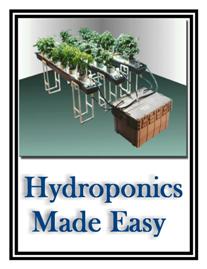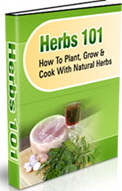Indoor herb gardens
 One popular option for home gardeners for a robust and health herb garden is growing an indoor herb garden. Whether you live in a climate that is not naturally suited to growing your favorite herbs, or you would like to grow herbs year-round, an indoor herb garden could be perfect for your needs.
One popular option for home gardeners for a robust and health herb garden is growing an indoor herb garden. Whether you live in a climate that is not naturally suited to growing your favorite herbs, or you would like to grow herbs year-round, an indoor herb garden could be perfect for your needs.
The first thing to consider with an indoor herb garden in the overall structure. Indoor herb gardens may simply consist of a few pots with your favorite herbs, or larger set-ups complete with grow lights. Hydroponics is another option. Take into account how much space you have, how much space you want to devote to your garden, and the direction your windows are facing (if using natural light).
Whichever structure you choose, there are certain advantages to an indoor herb garden. These include:
- Complete control over soil – indoor herb gardens are built on the soil you use. With an indoor garden you can completely control your soil mix to obtain optimal feeding, drainage, and warmth.
- Complete control over light – if you have an indoor herb garden, you can directly control the amount of light your garden receives. If you use a grow light, you can set a timer to activate the light a set intervals to provide the maximum light recommended for your herbs. You can also optimize the light for different plants, resulting in the best growing conditions for each species you are growing.
- Convenience – Indoor herb gardens also offer a great deal on convenience. You may tend to your herbs in good and bad weather at any time of day or night.
- Year-round Growth – With an indoor garden, you may grow your favorite herbs year round for tasty, fresh herbs no matter how cold it is outside
- Plants help keep the indoor air cleaner
- Insects and fungus are easier to keep under control
- Requires less fertilizer, if any
- No need for bird netting, weeding, or large gardening tools
Some disadvantages include:
- Less productive yields, however hydroponics can provide you with greater yields.
- Must provide adequate lighting either from sunlight or HID grow lights if sunlight is not sufficient
- Less growing space which, depending on your indoor accommodations, might mean less selection
- Proper watering can be more difficult since soil indoors doesn’t adjust or dry out as well which can result in over watering and root rot.
- Some say there’s less flavor, but I haven’t noticed it myself.
Feeding
Since your indoor garden is not pulling in nutrients from surrounding soil, you will need to feed it properly. Each variety of herb may require different nutrients and levels of feeding. Make sure to check on consult with guides for the recommended amount of nutrients for what you are growing.
Lighting
The light source for your plants is obviously extremely important. The first big question to ask yourself is if you want to use artificial or natural light. If you have an abundance of southern-facing windows, natural light may be the best way to go. If you are using artificial grow lights, make sure they do not dry out the leaves of your plants.
If using natural light, make sure to turn the plants a quarter turn each week to ensure proper lighting.
Watering
You indoor herb garden should be watered on a regular basis, just like an outdoor herb garden. Once thing that is often different with an indoor herb garden in humidity. During the winter months, indoor heat can greatly decease the indoor humidity, which will cause your indoor herbs to dry out much faster. Make sure to check the soil consistently to ensure proper moisture. If the soil is dry an inch from the surface, then it is time to water. You may also want to place pots full of water near your herb garden to protect it from dry air.
Set-up
Indoor herb gardens can be very simple or complex. Some choose to plant in regular pots while other choose to use more complex set-ups using lights and specific containers. Make sure not to locate your indoor garden near drafts or air vents, which can cause cool or dry conditions that are not optimal for growth.
Common Indoor Herbs
The following herbs are great for indoor growing, and do well in potted gardens. Planting and growing species that are known to do well indoors will make it much easier to have a healthy, vibrant indoor herb garden.
Aloe
Basil
Chives
Ginger
Lemongrass
Marjoram
Mint
Oregano
Parsley
Rosemary
Sage
Thyme


